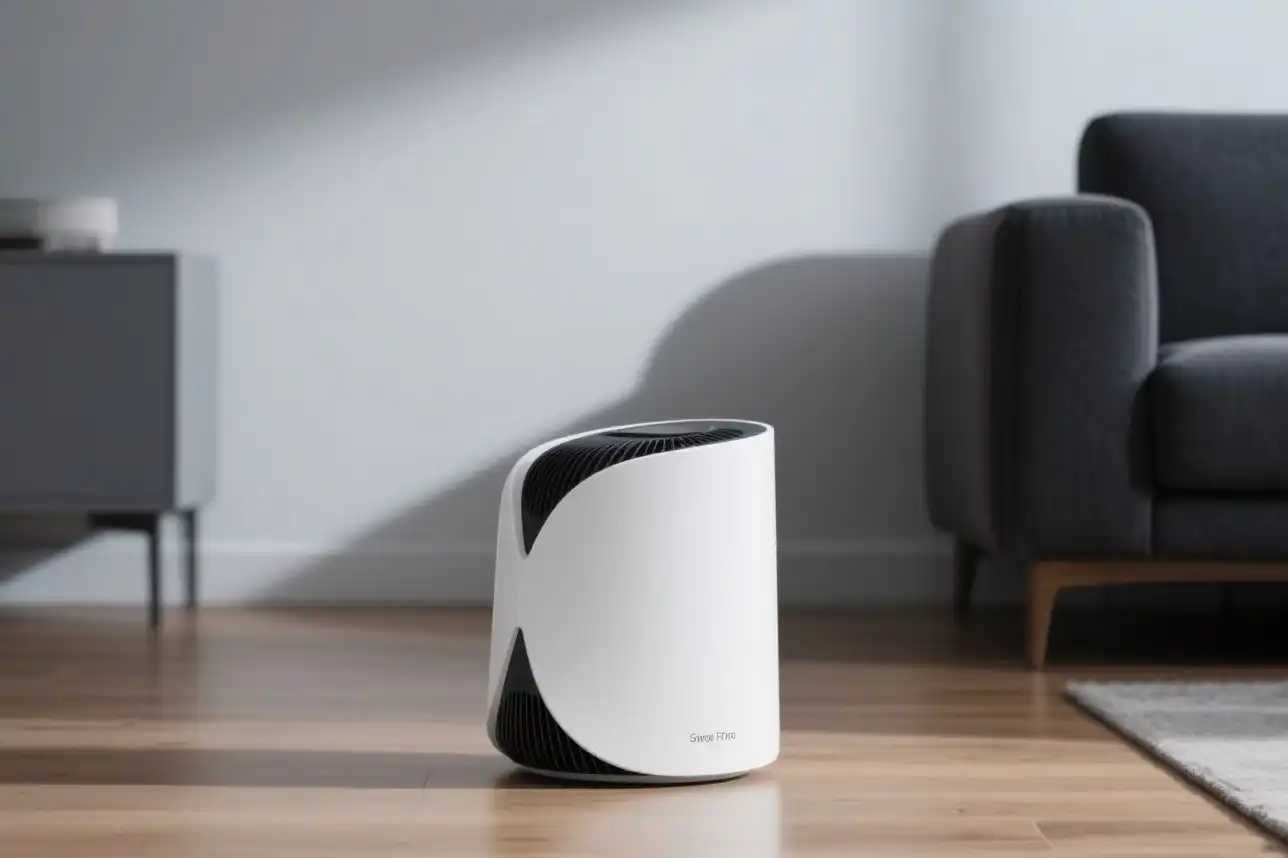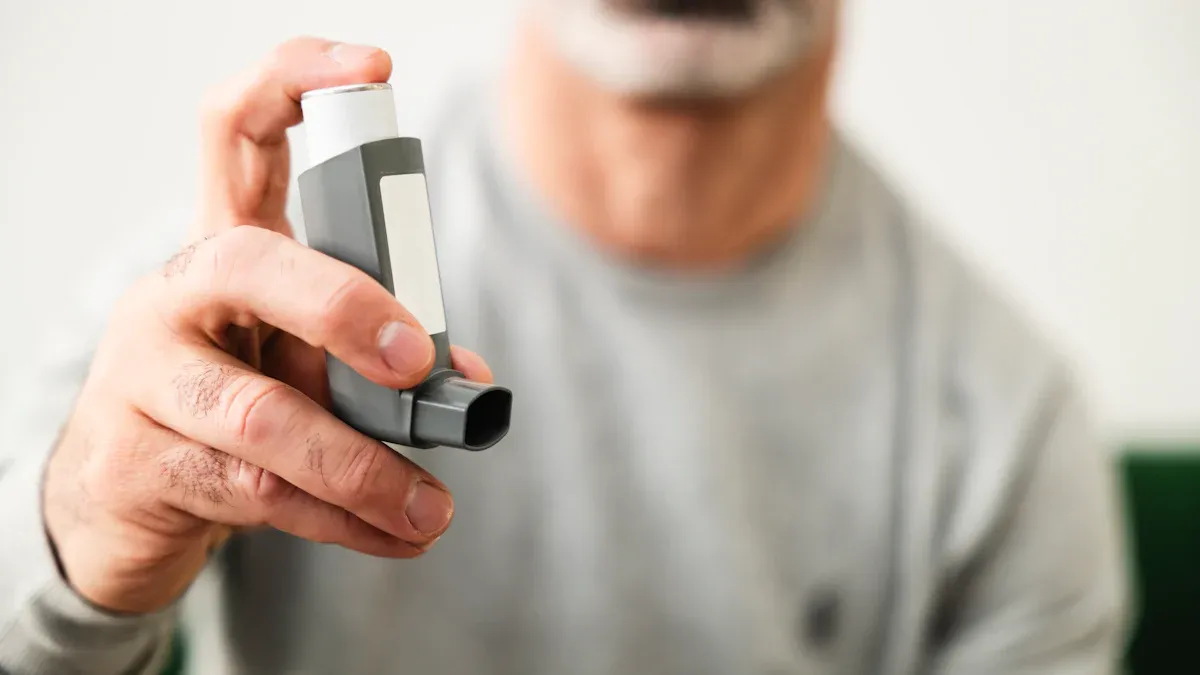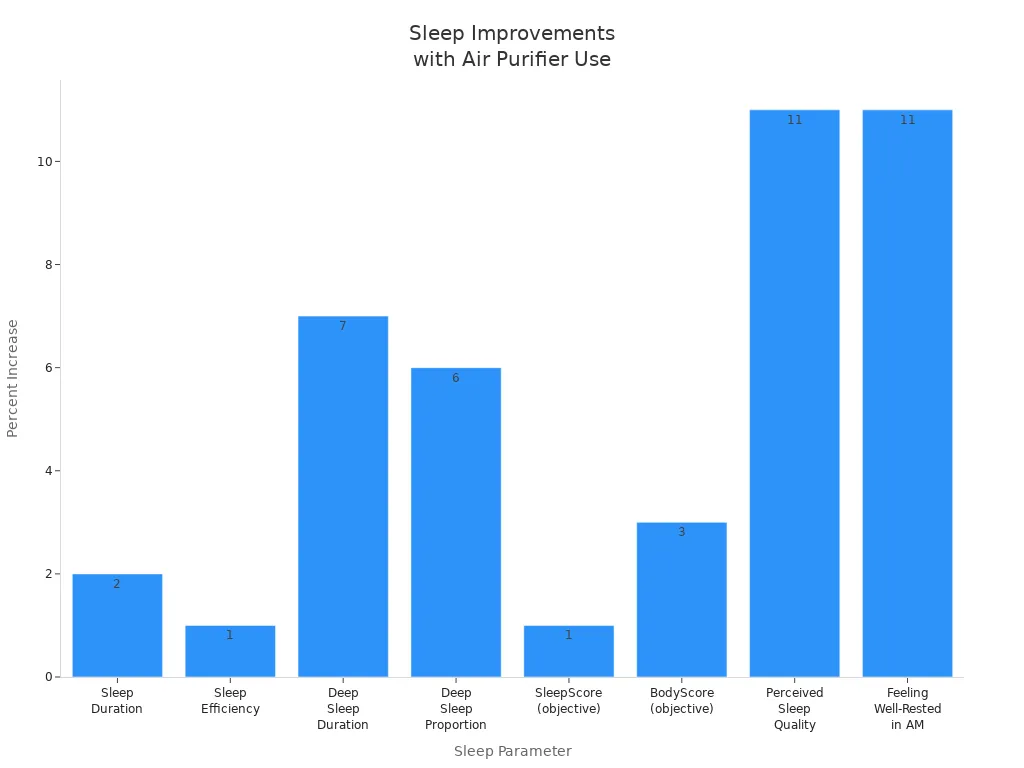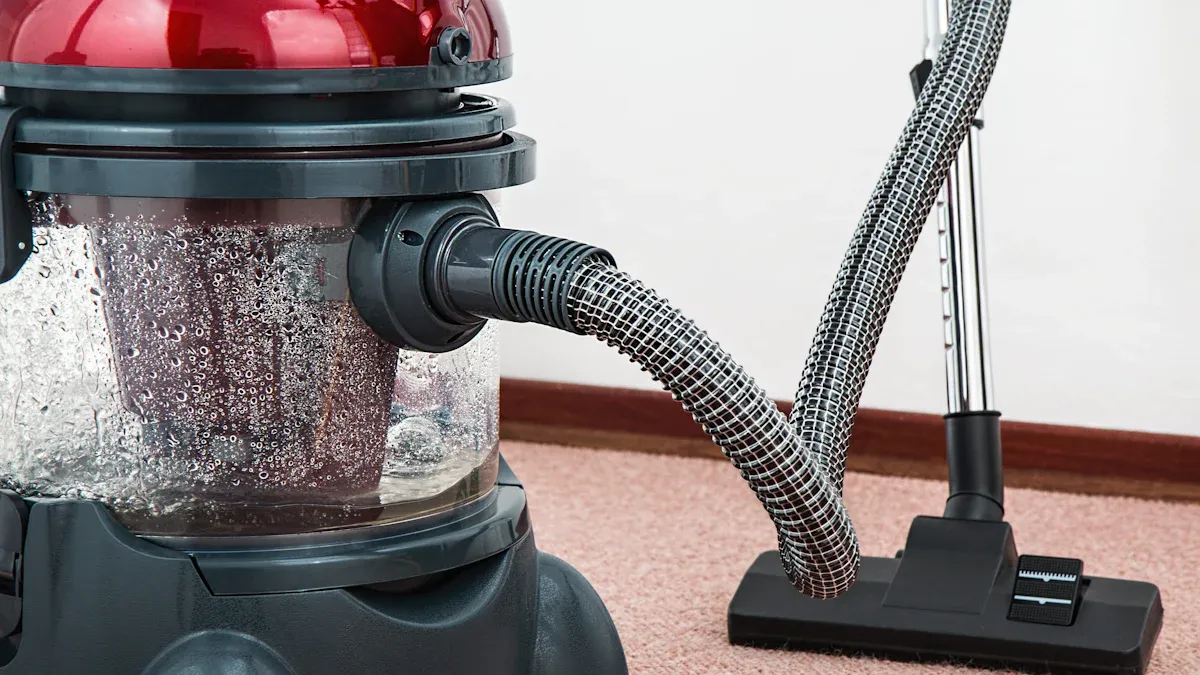
Have you ever thought about the benefits of air purifier in your home? Many homes have hidden pollutants like dust, mold, and pet dander, along with gases from cooking or cleaning. These contaminants can make it hard to breathe, trigger allergies, and even increase your risk of getting sick. Scientists and health experts highlight the benefits of air purifier in reducing these risks. You might not be aware of all the benefits of air purifier, but research shows they can significantly improve your daily life.
Key Takeaways
- Air purifiers take away dust, pollen, pet dander, and bad gases. This helps lower allergies and asthma problems. Using an air purifier can cut down germs in the air. This may help you get sick less often. Cleaner air from purifiers helps you sleep better. It does this by lowering things that bother your rest. Activated carbon filters in air purifiers take out bad smells. They also remove dangerous chemicals like VOCs. Put your air purifier in the right spot and change filters often. This makes sure you get the best air cleaning results.
How Air Purifiers Work
Filtration Basics
You may ask how air purifiers clean the air. Most air purifiers use more than one filter. These filters catch and remove things that are bad for you. The most common filter is called a HEPA filter. HEPA means High-Efficiency Particulate Air. This filter has a very fine mesh. It can catch tiny things as small as 0.3 microns. Air moves through the mesh. The mesh traps dust, pollen, pet dander, and some bacteria and viruses. HEPA filters can catch at least 99.97% of these tiny things.
Another important filter is the activated carbon filter. This filter does not catch particles. It uses a special kind of carbon. The carbon grabs and holds gases and smells. Activated carbon filters remove harmful chemicals like VOCs. VOCs come from cleaning sprays, paint, and tobacco smoke. These filters also help get rid of bad smells from cooking, pets, and mold.
Some air purifiers have extra features. They may use ultraviolet (UV) light or ionizers. UV light can kill some germs by hurting their DNA. Ionizers give particles a charge. This makes them stick to surfaces or plates inside the purifier. But these features can make ozone. Ozone can be bad if there is too much.
Tip: Using both HEPA and activated carbon filters gives you the best protection from particles and gases.
Pollutants Removed
Air purifiers can remove many types of indoor pollutants. Here is a quick look at what they can remove and why it matters:
| Pollutant Type | How Well Air Purifiers Remove It | Health Risks if Not Removed |
|---|---|---|
| Fine Particles (PM2.5) | Very effective (HEPA) | Asthma, lung disease, heart problems |
| Allergens (pollen, dander) | Effective (HEPA) | Allergies, asthma |
| Mold Spores | Some removal (HEPA) | Allergic reactions, asthma |
| Gases & VOCs | Effective (Activated Carbon) | Headaches, cancer risk, breathing issues |
| Odors | Effective (Activated Carbon) | Discomfort, poor indoor air quality |
You can see that air purifiers help protect you from many harmful things. Knowing how these filters work helps you understand why air purifiers are good for your health.
Benefits of Air Purifier for Allergies

Allergen Relief
When you are inside, you might sneeze or have itchy eyes. Sometimes your nose runs too. These problems often come from things like dust mites, pollen, and pet dander. Air purifiers can catch these small things before you breathe them in. HEPA filters in many air purifiers can take out up to 90% of common allergens. This gives you cleaner air and fewer allergy problems.
New research shows that using an air purifier at home can lower allergens in the air. For example, one review found that HEPA filters can cut allergen levels by 65% to 90%. You might need less allergy medicine if you use your air purifier a lot and keep it clean. One study showed adults with allergic rhinitis used 26% less medicine after six weeks with an air purifier. The benefits of air purifier use get better when you run it all the time and stay in rooms with filtered air.
Tip: Put your air purifier in the room where you spend the most time, like your bedroom or living room, for the best results.
Asthma Help
If you have asthma, you know clean air helps you breathe better. Air purifiers can take out tiny things called PM2.5 and PM10. These can make asthma worse and cause more attacks. Studies show air purifiers can lower these particles by 25% to 50%. When you use an air purifier, you may have fewer asthma problems and need less medicine.
Kids with asthma often get the most help. In one study, kids who used air purifiers had fewer breathing problems and needed less medicine. The air in their homes had much fewer harmful particles. But air purifiers work best when you also keep your home clean and stay away from things like tobacco smoke.
Bad indoor air can make asthma and allergies worse. Using an air purifier helps you control these problems and makes your life better. The benefits of air purifier use are clear for people with allergies and asthma, especially in homes with lots of dust or pollen.
Virus and Bacteria Reduction
Lower Illness Risk
There are many germs in your home that you cannot see. Viruses and bacteria float around, especially when people cough or sneeze. Some common viruses inside are the cold, flu, and stomach bugs. Bacteria like Staphylococcus and Mycobacterium tuberculosis also move through the air. These germs can stay in the air for hours. You might breathe them in without knowing.
Air purifiers with HEPA filters can catch these tiny germs. HEPA filters remove between 85% and 99.995% of small particles. Some air purifiers, like the IQAir HealthPro Plus, can trap even smaller things than most viruses. Using an air purifier lowers the number of germs in the air. This means you might get sick less often from germs in the air. The benefits of air purifier use are not just for dust and pollen. They also help keep you safe from germs.
Note: Air purifiers work best if you also wash your hands and keep your home clean.
Research Support
Many studies show air purifiers can quickly lower germs in the air. For example:
- Mobile air purifiers with HEPA filters cut down aerosols by up to 90% in 30 minutes in classrooms.
- The Philips 2887/10 model made the amount of germs breathed in six times less in a closed room with a sick person.
- The HYLA-EST device lowered PM10 by about 90% and PM2.5 by 80% in homes.
- Groups like ASHRAE and REHVA say to use HEPA and MERV 13–16 filters to lower the risk of getting sick indoors.
But, new reviews of many studies found no strong proof that air purifiers alone stop colds or flu at home. Most people still get sick from being close to someone who is sick. Air purifiers help lower germs in the air, but you should not use them as your only way to stay healthy.
Better Sleep
Nighttime Air Quality
You might not know that bedroom air can change your sleep. Dust, pollen, and gases can bother your nose and throat at night. This can make you cough, sneeze, or feel stuffed up. These problems can make it hard to fall asleep or stay asleep. Bad air can also lower the oxygen you breathe. You might wake up more and feel tired in the morning.
Here are some ways dirty air can hurt your sleep:
- Particulate matter, nitrogen dioxide, and sulfur dioxide can bother your airways. This can cause stuffy noses and coughing at night.
- Polluted air can make oxygen levels drop. You may wake up more and feel less rested.
- Allergens like dust mites and pet dander can make you sneeze and have itchy eyes. This makes sleeping harder.
- Air pollution can affect your brain. It can mess up your sleep cycles and stop deep sleep.
- Stress and worry from breathing bad air can make it tough to relax and fall asleep.
Air purifiers take these pollutants out of your bedroom. Cleaner air helps you breathe better and sleep well. Many people have fewer allergy problems and feel better at night after using an air purifier. This is a big reason to use an air purifier at home.
Sleep Studies
Scientists have checked how air purifiers help sleep. The results show people sleep longer and better. In one study, adults who used an air purifier at night slept six minutes longer. They also spent more time in deep sleep. People felt more rested in the morning and woke up less during the night.
| Sleep Parameter | Change with Air Purifier Use | Statistical Significance |
|---|---|---|
| Sleep Duration | +6 minutes per night (2% increase) | p = .043 |
| Sleep Efficiency | +1% relative increase | p = .022 |
| Deep Sleep Duration | +6 minutes per night (7% increase) | p < .001 |
| Deep Sleep Proportion | +6% relative increase | p = .009 |
| SleepScore (objective) | +1% increase | p = .048 |
| BodyScore (objective) | +3% increase | p < .001 |
| Perceived Sleep Quality | +11% increase | p < .001 |
| Feeling Well-Rested in AM | +11% increase | p < .001 |

Another study showed people with allergies had fewer problems and slept better after using an air purifier. Over 80% of users said they slept better and sneezed less. These results show air purifiers do more than clean air—they help you get the deep, restful sleep your body needs.
Odor and VOC Removal
Odor Control
Sometimes your home smells bad from cooking or pets. Cleaning products can also leave strong smells. These odors make your house feel less nice. Air purifiers help with this problem. They use activated carbon filters to trap odor molecules. The filters have tiny holes that catch the smells. This keeps the air you breathe fresher.
Some things that cause indoor odors are:
- Smoke from cooking or fires
- Pet dander and animal waste
- Mold and dust mites
- Cleaning agents and detergents
- New furniture or building materials
Activated carbon filters work better than most other ways. In one study, an air purifier with activated carbon cleaned the air faster than a hydroxyl radical generator. You get fresh air more quickly. The California Air Resources Board says activated carbon filters are good for removing odors and VOCs in homes.
Tip: Put your air purifier close to where the smell comes from for best results.
VOC Protection
VOCs are gases that come from many things in your house. You can find them in paints, glues, sprays, and some fabrics. Breathing in VOCs can make you feel sick. You might get headaches, sore eyes, or a scratchy throat. Sometimes you feel dizzy. Breathing VOCs for a long time can hurt your liver or nerves. Some VOCs can even raise your cancer risk.
HEPA filters cannot catch VOCs. They only trap particles. Activated carbon filters can grab VOC molecules and lower their amount in your home. Studies show air purifiers with these filters can cut VOCs by over half in most homes. To keep your air purifier working well, you should:
- Pick a purifier with an activated carbon filter that fits your room
- Change the filter often because it stops working when full
- Clean the vents and use a VOC sensor if you can
- Store products with VOCs safely and use them in rooms with open windows
Lowering VOCs helps keep you healthy and your home safe. Air purifiers make it easy to get rid of these hidden dangers every day.
Less Dust at Home

Dust Reduction
You might see dust on your tables, floors, and gadgets. Dust comes from things like skin flakes, fabric pieces, and dirt from outside. Air purifiers with HEPA filters catch these small bits before they land. This helps you clean less and dust less often.
- HEPA air purifiers can cut dust by about 30% to 39% in bedrooms over 6 to 12 months, based on studies with city families.
- The U.S. Environmental Protection Agency says HEPA filters take out at least 99.97% of tiny particles as small as 0.3 microns, which covers most dust at home.
- Clinical research shows HEPA air purifiers can lower indoor dust by up to 98% for very tiny bits.
- People often say they see less dust on things and fewer dust bunnies under beds after using air purifiers.
- To get the best results, put air purifiers in dusty rooms, keep doors and windows shut, and run the purifier all day.
Tip: Change your air purifier’s filter often so it keeps working well and your home stays cleaner.
Respiratory Health
Dust does more than just make your house look messy. It can also make it hard to breathe, especially if you have asthma or allergies. Dust has allergens from dust mites, cockroaches, and even mice. These can make you cough, sneeze, or wheeze.
- Studies show that less dust and fewer allergens at home mean more days without symptoms and fewer breathing problems for kids with asthma.
- One big study found that after a year of using HEPA air cleaners and other dust control steps, kids had fewer daytime symptoms and better lung health.
- Lower dust also means less swelling in your airways, which helps stop asthma and allergy flare-ups.
- Keeping the air dry and using air purifiers together can stop dust mites and pests from growing, making your home safer for your lungs.
Many people say their homes feel fresher and they breathe easier with air purifiers. Cleaner air means you and your family can live healthier and feel more comfortable. This is one of the top benefits of air purifier use for families with sensitive lungs.
Cognitive and Heart Health
Brain Function
You might not realize how much indoor air quality affects your brain. Clean air helps you think clearly and stay focused. Recent studies show that when you use air purifiers in classrooms, students can double their test scores. One study found a 101% increase in cognitive test results after improving air quality. This means you can solve problems faster and remember more information.
Air purifiers remove fine particles like PM2.5 and PM10. These particles can slow your thinking and make it hard to pay attention. In Los Angeles schools, using HEPA air cleaners led to better indoor air and fewer missed school days. Another study in Chile showed that children had better memory, attention, and problem-solving skills after just three weeks with air purifiers in their classrooms. Cleaner air helps your brain work at its best, whether you are studying, working, or just trying to focus at home.
Cleaner air supports your brain’s ability to learn and remember new things.
Heart Benefits
Your heart also benefits from breathing cleaner air. Air purifiers lower the amount of harmful particles in your home by more than half. This can help reduce your blood pressure and improve your heart’s health. A review of 14 studies found that using air purifiers lowered systolic blood pressure by about 2.5 mmHg. Even small changes like this can lower your risk of heart disease over time.
People with heart or lung problems, such as COPD, see even bigger improvements. Cleaner air can help your heart beat more regularly and reduce inflammation in your body. Studies show that air purifiers lower the risk of heart attacks, strokes, and even some types of dementia linked to blood vessel problems. Over many years, using an air purifier along with healthy habits can help prevent serious diseases and keep your heart strong.
The benefits of air purifier use go beyond just breathing easier—they help protect your brain and heart for the long term.
Maximizing Results
Placement Tips
You can boost your air purifier’s performance by choosing the right spot in your home. Many people do not realize that where you place your purifier matters as much as which model you buy. Follow these expert tips to get the cleanest air possible:
- Keep at least 3 feet of space around your air purifier. This prevents walls, furniture, or corners from blocking airflow.
- Avoid putting the purifier behind furniture, near walls, or in corners. Blocked airflow means less clean air for you.
- Place desktop or tabletop models at breathing height. This helps the purifier catch airborne particles before you inhale them.
- Set the purifier near pollution sources like doors, windows, kitchens, or pet areas. This lets the purifier trap contaminants early.
- Match the purifier’s size to your room. A small purifier cannot clean a large space well.
- Keep the purifier away from electronics by at least 5 feet. This reduces the risk of interference.
- Make sure the air outlet faces the center of the room and stays clear.
- Run your purifier continuously in rooms with lots of pollution. Use smart sensors if your model has them.
- Change filters and clean the unit regularly to keep it working at its best.
Tip: Professional installation can help you avoid common mistakes like poor placement or using the wrong filter type.
Healthy Habits
You can make your air even cleaner by adding a few simple habits to your daily routine:
- Open windows for a few minutes each day to let in fresh air.
- Use exhaust fans in kitchens, bathrooms, and laundry rooms to remove moisture and odors.
- Run ceiling fans to help air move around your home.
- Check your home’s ventilation system often to make sure it works well.
- Exercise and spend time outdoors to bring in fresh air and support your health.
- Eat a balanced diet and drink enough water to help your body stay strong.
- Practice stress management, like deep breathing or mindfulness, to support your overall well-being.
Note: Regular filter changes and cleaning are key. Dirty filters cannot trap pollutants and may even release them back into your home.
By following these tips and habits, you help your air purifier work better and keep your indoor air as healthy as possible.
Air purifiers can really help you at home. These are the seven main benefits of using an air purifier:
- They help with asthma and allergies by taking out dust, pollen, and pet dander.
- They lower indoor air pollution, which helps stop breathing problems.
- They make your sleep better by removing allergens from your bedroom.
- They get rid of bad smells and dangerous chemicals like VOCs.
- They lower your chance of getting sick by cutting down germs in the air.
- They help your heart and brain by taking out tiny particles.
- They reduce dust, so your home is cleaner and safer.
Even small changes in your air can make you healthier, help you focus, and keep you from getting sick. Try using an air purifier or tell someone who needs cleaner air about these benefits!
FAQ
How often should you change your air purifier filter?
You should check your filter every 3 to 6 months. If you see dust or notice less airflow, replace it sooner. Some models have a light that tells you when to change the filter.
Can air purifiers remove cigarette smoke?
Air purifiers with HEPA and activated carbon filters can help reduce smoke particles and odors. They do not remove all harmful chemicals from cigarette smoke. For best results, avoid smoking indoors.
Do air purifiers make a lot of noise?
Most air purifiers run quietly on low settings. Some models have a “sleep mode” for nighttime use. You may hear a gentle fan sound, but it should not disturb your sleep.
Where is the best place to put your air purifier?
Place your air purifier in the room where you spend the most time, like your bedroom or living room. Keep it away from walls and furniture for better airflow.
See also
How Air Purifiers Maintain Clean Air in Modern Homes
Whether one air purifier can be suitable for multiple rooms
What to Consider Before Putting an Air Purifier in Every Room
